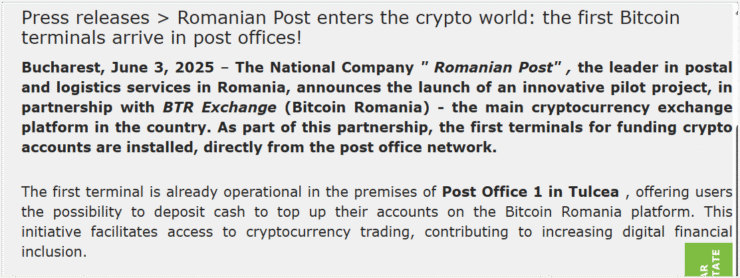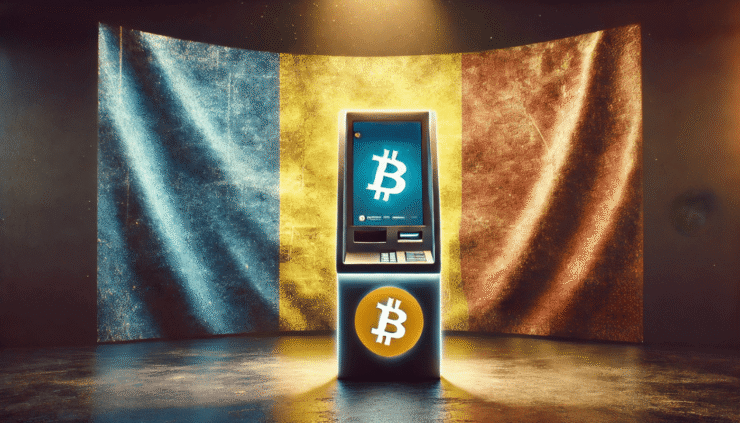Romania’s national postal service, Poșta Română, has launched its first Bitcoin ATM in the city of Tulcea, in partnership with local crypto exchange Bitcoin Romania (BTR). The initiative represents a forward-looking effort to modernize public service infrastructure with blockchain-powered financial tools.
The new ATM allows users to buy and sell Bitcoin directly, offering an accessible entry point for both retail users and crypto newcomers. By embedding digital asset services within a trusted national institution, the rollout is expected to improve financial inclusion and encourage broader cryptocurrency adoption.
According to an official statement, additional ATMs are planned for several cities, including Alexandria, Piatra Neamț, Botoșani, and Nădlac. These locations were strategically selected to cover both urban centers and underserved rural areas where access to traditional banking services remains limited.

By integrating Bitcoin ATMs into postal branches, Romania is signaling a new national approach to crypto—one that leans toward inclusion and practical access rather than resistance. In many towns and villages, post offices serve as a primary financial access point, making them ideal venues to introduce decentralized finance tools to the public.
Bitcoin Romania and State Backing Signal Mainstream Shift
Bitcoin Romania, one of the country’s most established crypto platforms, is providing the hardware and backend infrastructure for the rollout. The company has confirmed this deployment is just the beginning, with plans to expand the ATM network to additional post offices and government service centers.
In a press release, Poșta Română said the program aims to “diversify its portfolio of services and address the needs of younger, tech-savvy clients,” underscoring the institution’s broader ambition to stay competitive in the digital age.
The state-backed nature of this partnership lends additional credibility to crypto in Romania—a country still emerging from decades of centralized economic policy. The move also reflects a shifting perception of digital currencies in post-communist countries where skepticism toward alternative finance was once high.
Wider European Trend Toward Bitcoin Accessibility
Romania’s initiative aligns with a larger trend across Central and Eastern Europe, where countries like Slovenia, Poland, and the Czech Republic are rapidly adopting crypto-friendly infrastructure. Bitcoin ATMs, merchant integrations, and public sector partnerships are becoming more common as consumer demand rises.
The rollout also coincides with the European Union’s Markets in Crypto-Assets (MiCA) regulatory framework, which has played a pivotal role in standardizing crypto rules across the EU. For member states like Romania, MiCA offers legal clarity that empowers both private firms and public institutions to engage with blockchain innovation confidently.
Implications for Crypto’s Retail Adoption Path
While Romania isn’t yet a leading crypto hub compared to Western Europe, embedding Bitcoin services into public institutions could accelerate mainstream adoption. These ATMs serve not only as a convenience but as symbolic access points—bridging the digital divide between traditional users and the decentralized economy.
If the rollout succeeds, it could become a model for other government-backed crypto integrations in emerging markets, showing that state institutions and digital assets can work in tandem to modernize national financial systems.
Quick Facts
- Romania’s first Bitcoin ATM launched in Tulcea via Poșta Română.
- Developed in partnership with Bitcoin Romania (BTR).
- ATMs planned for Alexandria, Piatra Neamț, Botoșani, and Nădlac.
- Aims to promote financial inclusion and crypto adoption.
- Part of a wider European trend toward public crypto access under MiCA.





